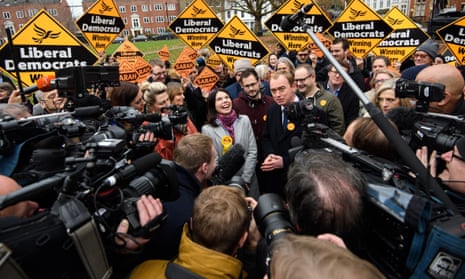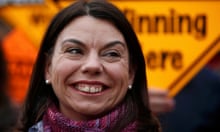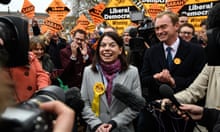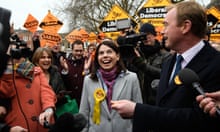The Liberal Democrat victory in Richmond Park was a triumph for Sarah Olney, her campaign team, and the strategy of the leader, Tim Farron, who declared in his conference speech in September that the party could win as the voice of the 48%. It is also a compelling example of what can be achieved if pro-European Tories, Labour, Greens and Lib Dems work together. And while Ms Olney’s defeated rivals will take comfort from the nature of the byelection – in a prosperous, pro-European corner of south-west London that might have been tailored for a Lib Dem revival – there is no hiding from the fact that it was a personal humiliation for Zac Goldsmith. It was his second defeat of the year, close on the heels of his shameful campaign to become London mayor. It should, at the least, give the prime minister, whose working majority is now just 13, reason to reconsider her divisive rhetoric. And Labour, which won fewer votes than it has members in the seat, must bang heads together to get a clear, less contested approach to Brexit.
After the rout of the 2015 general election, many Lib Dems gloomily anticipated years of rebuilding. They may still be right. Yet even if Richmond Park, a seat they held from 1997 to 2010, could hardly be bettered as a battleground for them, it remains an extraordinary achievement to win it with a 20-point swing from the Tories. The party’s once-formidable byelection machinery had been well-oiled and successfully trialled at the Witney byelection in October. Party activists and past leaders turned out in impressive numbers to support a strong local candidate, who – new to politics – was untainted by association with the coalition years. In her victory speech in the early hours of this morning, Ms Olney sounded exactly the right note of unity and conciliation over Europe, ending on the rousing pledge that “we will not let intolerance, division and fear win” – an overture all the more attractive in the light of the bilious response to the result from the Brexiters.
In their heyday, Lib Dem byelection triumphs were often built on squeezing the Labour vote, and that was certainly true in Richmond Park. Labour’s national poll standing might be uncomfortably low, but it is not the 3.6% share of the vote they won on Thursday, any more than the Lib Dems’ is 49%. Yet the result, even in a seat where it would never win, does highlight Labour’s uncertain signalling about Europe. While the shadow Brexit minister Kier Starmer and his one-person team methodically devise ways to pin down the government’s negotiating position, the shadow chancellor races far beyond the agreed party line, declaring last week that leaving the EU presented “enormous opportunities”. The result also looks like a more general warning about the fragmentation of the left. While the Tories, attracting back Ukip defectors, appear in command of the right, the left faces a threat of uncertain scale from Ukip’s new, working-class, pro-hanging Liverpudlian leader, Paul Nuttall, who has made replacing Labour his main mission.
Meanwhile the Tories, sheltering behind Zac Goldsmith’s status as an independent, downplay the significance of the result. But although Mrs May might take comfort from her current high standing in the polls, a significant number of her MPs – many with majorities over Lib Dem challengers that are much smaller than the 23,000 in Richmond – will be looking nervously behind them.
Yet the Lib Dems cannot afford too much jubilation. The assertion that a hard Brexit won’t now happen when many people still hope that it will risks jumping way ahead of popular opinion. Remain is still losing rather than winning support. There is no appetite for a second referendum. The urgent job in hand is to work out what a soft Brexit looks like and start to build a coalition across parties that can hold the government to account for delivering it. Only if it ends with a wide perception that it has failed can there be an honest campaign to try to stop it.







